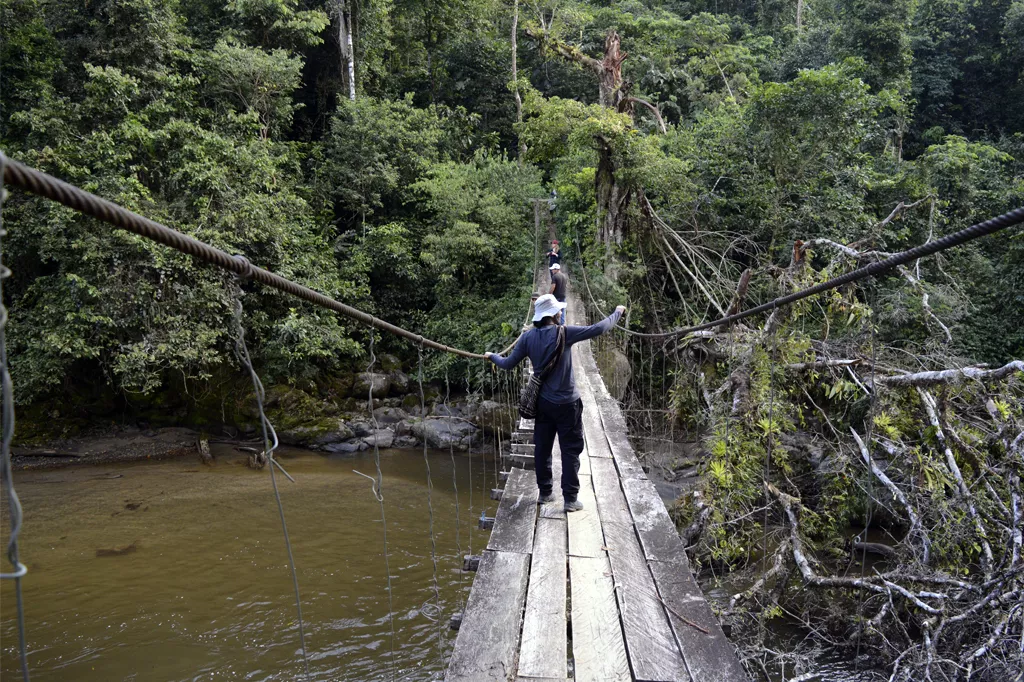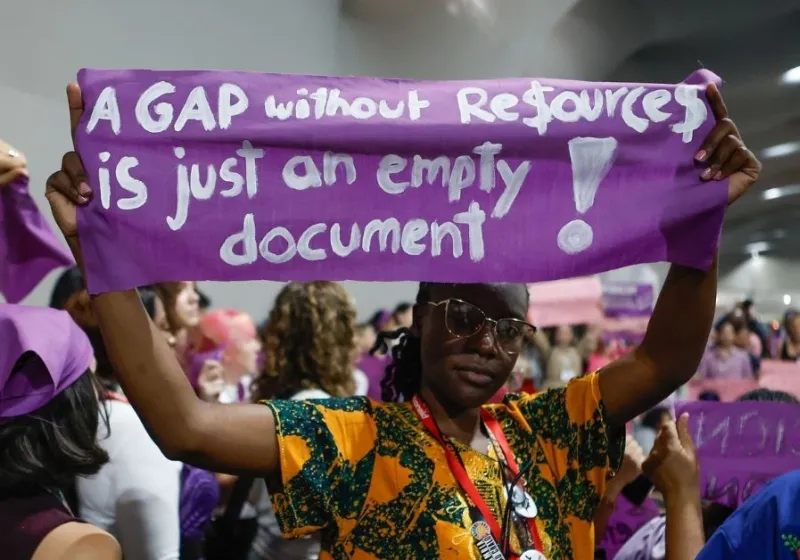Gazing over the valley: a chronicle of a journey to hope

Text by: Juliana Malagón, ForumCiv Regional Office for Latin America and the Caribbean
Miravalle is a village in the municipality of San Vicente del Caguán that lives up to its name (“Miravalle” would be something like “gaze-valley”. Between the mountains of the Pato river basin and after hours of a trail ride, in the distance and on a hill, you can see the town built by former FARC combatants.
When we describe Colombia, we usually highlight its beautiful landscapes and its immense diversity. Still, despite having in mind the existing natural wealth in our country, we realize that the territory is much more extensive than we usually imagine, when we get to travel and explore it. As we get near to the mountains, there is much more than just trees, and there are roads that lead to places that seem remote. I realized this when I traveled to the Caquetá region, in Eastern Colombia, where the immense plains that connect to the Amazon are born. El Pato and many other rural areas of this region have been historically forgotten by the government; territories occupied by the FARC and other outlaw groups, whose tension with a State that has been present almost exclusively through army troops, made them "red zones". Following the signing of the Peace Agreement in 2016, Miravalle became a concentration and settlement place for former combatants, now known as Territorial Spaces for Training and Reintegration (ETCR its acronym in Spanish). The county of Miravalle, located about three hours from the urban center of San Vicente del Caguán, has a primary economic source in the local agricultural products, and after the signing of the peace agreement is now betting on ecological tourism as an alternative income for local inhabitants.
The journey began with great expectations. For many years all I heard, read and saw about this region was about violence, death, blood, pain, injustice and terror. I wanted to know this place, rich with so many stories. I knew that there were other versions and other images behind what I had always heard, and I was eager to know them and share them.
I arrived in Miravalle together with my colleagues from the ForumCiv programme team to evaluate some of the processes carried out by the ETCR and to coordinate towards the accompaniment of some productive projects. In the framework of the Aremos Paz project, implemented together with five other Swedish civil society organisations, and with the support of the European Peace Fund, ForumCiv supports, coordinates, and accompanies some of the production projects' technical implementation carried out by some of the ETCR cooperatives, based on a subgranting modality of third-party financial support. From this point of view and with the opportunity to stay in the territory for a few days, we had the opportunity to leave the mental comfort zone in which the urban enviroment maintains us; El Pato is a perfect place to open the mind and recognize our history from other perspectives, not much visible in the mainstream media and here narrated by its inhabitants, full of details and emotions.
I was curious about the organisational system they run at ETCR; when we were assigned a place to sleep, I realized that each house has a designated space to receive guests, allowing each household to provide the hosting service on a rotating system. This is the basis of their participatory system, and this is how all the functions in the ETCR are designated. The purpose of these rotations is to be equitable because, this way, everyone has the opportunity to generate economic income.
Visits to the territory are scheduled so that when tourists arrive, or project coordinators and other members of organisations or groups need to stay overnight, there is already a list in which visitors are assigned a house to sleep in, and another house to receive the foodservice.
Agricultural work is also assigned. In Miravalle there are crops of tomato, beans, cane, banana and plantain, as well as swine and fish farming. Among the outstanding tourist services offered are rafting and hiking, all in the hands of reincorporated people trained in each area.
At the foot of the mountain, the community greets people with the mighty sound of the Pato river, also with popular Colombian music coming from the bar and with the screams of the soccer match players on the nearby court. From here you can see the village and the road to get to it, in the top of the hill. During our walk, in the path we see some greenhouses and ponds for fish farming. After finishing the walk and arriving to the village, the initial welcome is offered to us by the portraits of Manuel Marulanda and Jorge Briceño, two of the most historical FARC commanders, drawn on the walls of a colorful house.
Structurally, the town of Miravalle is a long street that crosses the mountain's spine, where each house is at the same time an artistic canvas, a family, dozens of projects and hundreds of stories. Miravalle lives up to its name because there is a view towards a green landscape from any point of the mountain, giving the impression of abundance.
Despite the height, nothing looks insignificant. From here, the Pato river continues to show its flow, the music of the bar comes as an echo and you can perceive the emotion aroused by the soccer match that is played below. Being in this viewpoint, the senses sharpen, the air enters the body smoother, more relaxed; the pupils widen, the landscape from here is immense, it is not enough to look, it is necessary to observe; the melody created by the sounds of nature invades the ears leaving the mind blank, for a moment nothing seems to matter. Likewise, the sense of touch disappears. It is as if the body enters in a state of complete rest while observing the landscape. To feel your feet on the ground again and accompany the landscape, the best way is to taste a coffee prepared by one of the village's inhabitants, perhaps combined with a pleasant chat.
There are as many anecdotes of war and pain as those of overcoming and happiness. While enjoying this viewpoint, they explain how that same mountain was a strategic site during the war because from here, you get broad overview of the area. They point to me some places where in the past bombs wiped out people, flora and fauna, leaving hollows in the ground, surrounded by devastation and corpses. Where I gaze at an incomparable and majestic landscape, they recognize their life shaped by unforgettable memories, good and tragic, and the memory of the graves of relatives and comrades.
For many people, this would be a good reason to want to forget and never see these lands again, but for the reincorporated people from the former mobile Teófilo Forero column (one of the most powerful and effective mobile military structures FARC had), it is the most substantial reason to want to see Miravalle prosper; the rootedness and sense of ownership is in each one of the inhabitants of the village who claim to have responsibility for this territory, whose recovery also implies the recovery of the social fabric, or something that in ForumCiv we have called (coining the term from anthropologist and Truth Commissioner Alejandro Castillejo) the building of a peace on a small scale.
Evidence of this commitment can be found in the multiple initiatives they are implementing. One of these initiatives came from a group of young people, who decided to create a media called "La Magiña", a name that, according to what Michel Rojas (member of the ETCR and community communicator) told me, alludes to an ant that is very small and appears to be defenseless. Nonetheless, when it bites, it causes a lot of pain. "The media must be like this," says Michel, "no matter how small our group is, the information that comes out must be forceful".
The evening was accompanied by "Farian" music (composed and produced by FARC members), some beers and stories of the people who were sharing there with us. One of these stories was about the song "El barcino" by Jorge Villamil, which talks about a bull of beautiful print: "When in the times of the violence, the guerrillas took him, with "Tirofijo", crossed paths, reaching El Pato and Guayabero..."
María de los Ángeles, one of the coordinators of the ETCR, remembers with grace to have heard Manuel Marulanda, better known as "Tirofijo", complaining because of that song. She mentions that he claimed that the story of the barcino (a word that describes an animal -I this case a bull- of a reddish color) had been a misunderstanding, that he was a guerrilla member and not a thief, and that, therefore, the accusations made in the song were unfounded.
I say goodbye to Miravalle already with the nostalgy of leaving the village and the people's kindness, the landscape, the stories and projects, all of which make the place a very welcoming experience. The community has the doors open for those who dare to visit, and there will always be something new to learn or just listen to. Also, it is an excellent tourist destination to get out of the routine and support their initiatives towards peacebuilding and reincorporation.
The journey offered me many anecdotes, some personal and some shared by the reincorporated people. I got to know a little about the dreams and fears of some men and women who inhabit the village, their projects and initiatives that daily contribute to a #PeaceInASmallScale. After being there, it is now clearer my awareness on how every action in any corner of the country counts and adds to the building of peace. As a promise, I have to return to learn the local "cuadrito" dance, live the rafting experience, and follow up on the Aremos Paz project.
También disponible la versión en español de esta crónica (also available, the Spanish version of this chronicle):
Other recent articles

ForumCiv’s social media accounts labelled as “extremist materials” in Belarus
Important message to our Belarusian followers. Any interaction with our content can now lead to legal consequences in Belarus. Please read the information below and take the necessary precautions for...

ForumCiv enters new strategic partnership
ForumCiv is proud to announce a new three-year strategic partnership with Sida, totalling SEK 137 million.

ForumCiv at COP30: African voices at the centre of climate justice
ForumCiv is participating in COP30 in Belém to amplify the voices of African civil society, who stand at the frontlines of the climate crisis yet are often excluded from decision-making.